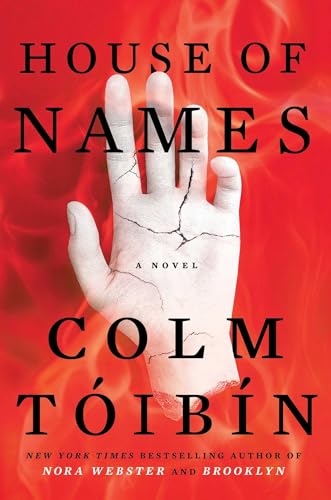Críticas:
"The misadventures of Agamemnon and his family were repeatedly retold in Greek mythology...In his new novel, House of Names, Colm Toibin explores part of this story, from the murder of Iphigenia to the murder of Clytemnestra, making it strike a new chord, far more impressive than the pious respect or worthy aura of 'classicism' that often surrounds it. Part of Toibin's success comes down to the power of his writing: an almost unfaultable combination of artful restraint and wonderfully observed detail....[this] transforms his account of the sacrifice of Iphigenia from what could all too easily have been a ghastly version of operatic bombast into a moving tragedy on a human scale...he is also very good on exploiting the puzzling gaps in the ancient narrative, especially where Orestes is concerned...But Toibin has bigger themes in mind, too, particularly the cycle of violence that seems to trap the family of Agamemnon."--Mary Beard "The New York Times Book Review "
"[A] psychologically probing and intimate retelling of the Greek tragedy...Toibin's prose is stark and mesmerizingly readable. It reveals the horrors but doesn't sensationalize them -- which makes them even more horrific, as he meticulously reproduces the inexorable and inevitabilities of Greek tragedy. The calm ruthlessness of the tale adds to its terrors...[a] magnificent novel."--Sam Coale "The Providence Journal "
"Exquisite...[Toibin] makes modern psychological drama out of the Greek mythological cycles of violence that destroyed Clytemnestra and her family, wresting human motives out of stories that might otherwise feel alien to our culture."--Boris Kachka "New York Magazine "
"A devastatingly human story...savage, sordid and hauntingly believable."--Kate Clanchy "The Guardian "
"A giant amongst storytellers, Toibin has thrown down the gauntlet with his latest novel . . . And it is a masterpiece."--Edith Hall "Daily Telegraph "
"A Greek House of Cards... Just like Heaney at the end of his Mycenae lookout, Toibin's novel augurs an era of renewal that comes directly from the cessation of hostilities."--Fiona Macintosh "Irish Times "
"Vengeance, betrayal and elemental passion never go out of style."--Kathleen Rooney "The Chicago Tribune "
"A creative reanimation of these indelible characters who are still breathing down our necks across the millennia... [Tóibín] pumps blood even into the silent figures of Greek tragedy... Despite the passage of centuries, this is a disturbingly contemporary story of a powerful woman caught between the demands of her ambition and the constraints on her gender...Never before has Tóibín demonstrated such range, not just in tone but in action. He creates the arresting, hushed scenes for which he's so well known just as effectively as he whips up murders that compete, pint for spilled pint, with those immortal Greek playwrights."--Ron Charles "The Washington Post "
"Although a reader may know what's coming, the novel's imaginative take on the twisted psychology behind the horrific acts is what keeps it compelling... The final chapters are among the most mysterious and beautiful Tóibín has written; a high bar."--Claude Peck "The Minneapolis Star Tribune "
"[An] extraordinary new novel... Drawing upon Greek tragedy as deftly as he borrowed the story of the Virgin mother in his 2013 Booker Prize finalist novel, The Testament of Mary, Tóibín has found the gaps in the myth, reimagining all as a profoundly gripping and human tale... you can see at once the marvelous writer Tóibín is, and how he works best under a set of self-imposed restrictions...--John Freeman "The Boston Globe "
„Über diesen Titel“ kann sich auf eine andere Ausgabe dieses Titels beziehen.
![]()
